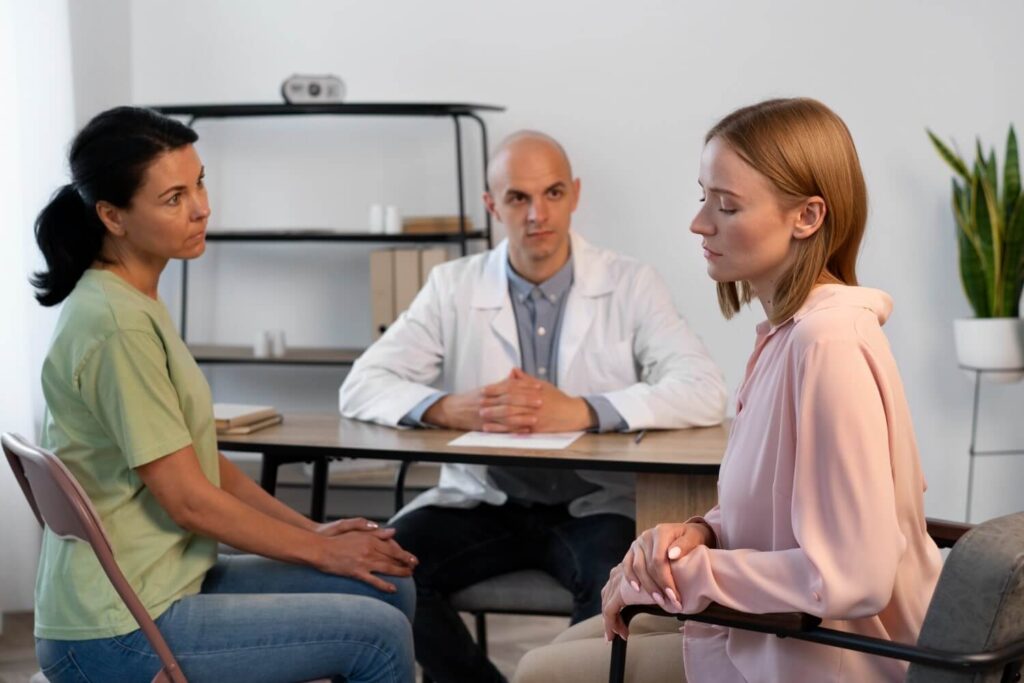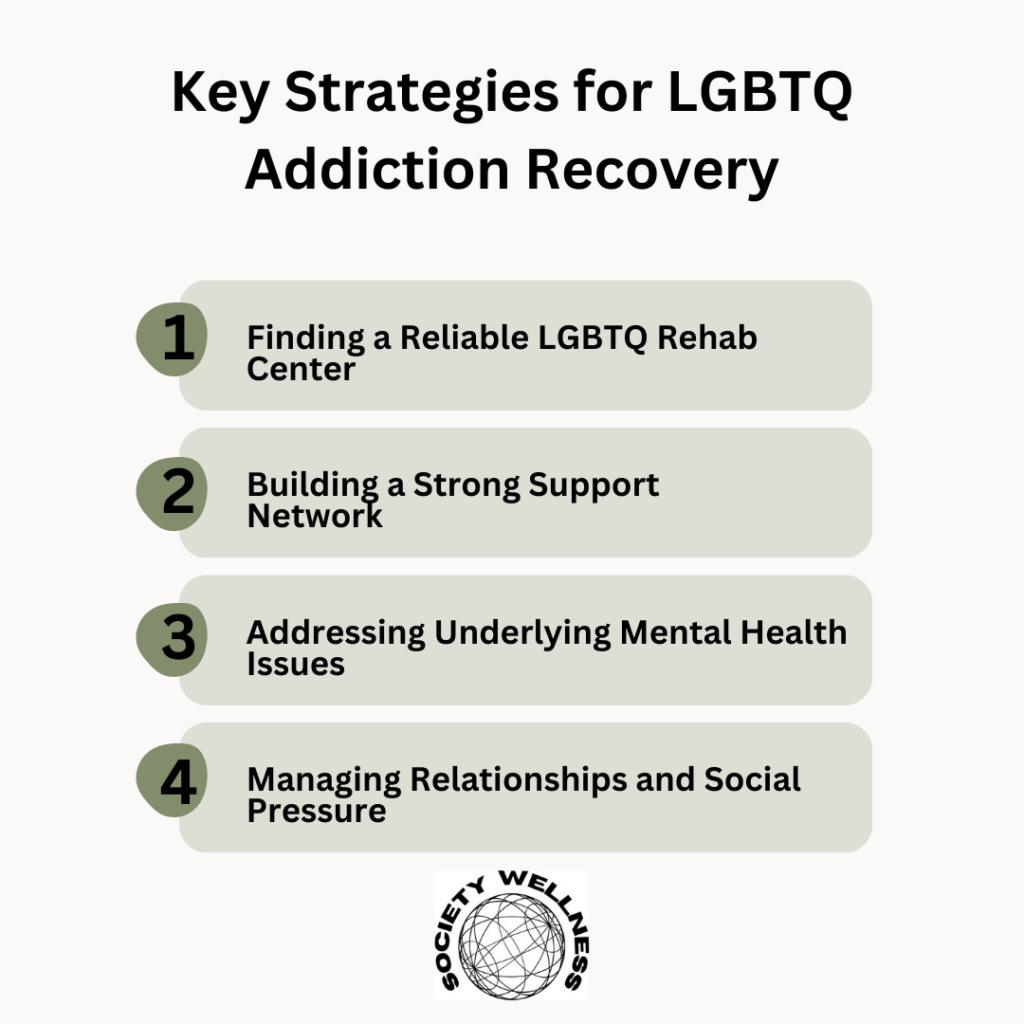No matter who you are. The road to addiction recovery is difficult for everyone. It becomes more challenging when you belong to the LGBTQ community. Fears like stigma, social discrimination, and lack of understanding of LGBTQ people may worsen the feelings, which results in substance misuse. However, with the correct strategies and support, these obstacles can be ignored or turned into strength.
In this blog, we’ll explore key strategies for effective LGBTQ addiction recovery and how they empower individuals to overcome challenges and achieve long-term sobriety.
1. Embrace LGBTQ-Specific Rehab Programs
One of the most crucial steps for LGBTQ individuals in recovery is choosing a rehab program that understands and supports their unique needs. LGBTQ-specific rehab centers offer a safe, inclusive environment where individuals can address their addiction without fear of judgment or discrimination.
Benefits of LGBTQ Rehab Programs:
- Affirming Environment: LGBTQ rehab centers provide a space where individuals can openly discuss their identity and experiences without stigma.
- Culturally Competent Care: Therapists and counselors trained in LGBTQ issues offer care that is empathetic and aligned with the individual’s specific needs.
- Community Support: Being surrounded by others who share similar experiences fosters a sense of belonging and reduces feelings of isolation.
2. Address Co-Occurring Mental Health Issues
Many LGBTQ individuals face co-occurring mental health conditions, such as anxiety, depression, or PTSD, often linked to discrimination or trauma. Effective addiction recovery for LGBTQ individuals must address both addiction and mental health simultaneously through dual-diagnosis treatment.
Key Strategies for Mental Health and Addiction Recovery:
- Therapy for Trauma: Trauma-informed therapy helps LGBTQ individuals work through the emotional scars of discrimination, family rejection, or violence.
- Cognitive Behavioral Therapy (CBT): Cognitive Behavioral Therapy evidence-based therapy helps individuals identify and change negative thought patterns that may contribute to both mental health struggles and addiction.
- Group Therapy: Group therapy sessions, specifically designed for LGBTQ individuals, provide a supportive environment where individuals can connect with peers facing similar challenges.
3. Build a Strong Support Network
Recovery is not a journey that should be undertaken alone. For LGBTQ individuals, finding a strong support network is essential to overcoming challenges and maintaining long-term sobriety. This support can come from LGBTQ-specific support groups, peers, friends, or chosen family members who understand the unique struggles faced by the LGBTQ community.
Building a Supportive Community:
- LGBTQ Support Groups: LGBTQ-specific 12-step programs, such as Alcoholics Anonymous (AA) or Narcotics Anonymous (NA), offer a safe space for individuals to share their experiences and find encouragement.
- Sober LGBTQ Communities: Online platforms and local organizations offer sober communities where LGBTQ individuals can connect, share advice, and support each other’s recovery journey.
- Chosen Family: If biological family support is not available, chosen family—friends who become close supporters—can play a critical role in the recovery process.
4. Focus on Holistic Healing
LGBTQ addiction recovery is about more than just overcoming physical addiction—it also involves emotional, mental, and spiritual healing. A holistic approach to recovery focuses on treating the whole person, not just the addiction, which is especially important for LGBTQ individuals who may be dealing with complex emotional challenges.
Key Holistic Approaches to LGBTQ Addiction Recovery:
- Mindfulness and Meditation: These practices help individuals stay present, reduce stress, and develop healthier coping mechanisms for cravings or emotional triggers.
- Art and Music Therapy: Creative therapies allow LGBTQ individuals to express emotions they may struggle to articulate, providing a therapeutic outlet for pain and trauma.
Exercise and Nutrition: A focus on physical health helps individuals regain strength and energy, promoting overall well-being during recovery. Incorporating exercise and balanced nutrition can significantly improve mood, reduce anxiety, and increase mental clarity.
5. Develop Coping Skills for LGBTQ-Specific Challenges
LGBTQ individuals often face challenges such as discrimination, family rejection, and societal stigma, which can make recovery more difficult. Developing strong coping skills to handle these external stressors is crucial for maintaining sobriety.
Effective Coping Strategies:
- Set Healthy Boundaries: Learning how to set boundaries with people who are not supportive can help reduce emotional stress and protect mental health.
- Resilience Building: Therapy that focuses on resilience helps individuals cope with external discrimination by empowering them with tools to handle difficult situations.
- Self-Acceptance: Working towards self-acceptance is vital for LGBTQ individuals in recovery. Overcoming internalized homophobia or transphobia is a key aspect of healing and long-term recovery.
6. Engage in Aftercare and Ongoing Support
The journey to sobriety doesn’t end after rehab. Ongoing support is essential for long-term success. LGBTQ individuals benefit from tailored aftercare programs that include therapy, peer support, and relapse prevention strategies.
Elements of Effective Aftercare:
- Continued Therapy: Ongoing therapy helps individuals address any emerging emotional issues, work through challenges, and stay focused on recovery.
- Relapse Prevention: LGBTQ rehab centers provide tools and strategies to prevent relapse, including identifying triggers and developing coping mechanisms for stress.
- LGBTQ-Specific Support Networks: Continuing participation in LGBTQ support groups ensures that individuals have a community to lean on even after completing formal treatment.
Challenges and Strategies for Effective LGBTQ Addiction Recovery
1. Finding The Reliable LGBTQ Addiction Treatment Center
One of the most important steps in recovery is to find a treatment facility that is not just knowledgeable about addiction but also affirms LGBTQ identities. These centers provide a secure environment in which people can express their sexual orientation and gender identity without fear of being judged or discriminated.
By addressing the unique stressors that LGBTQ persons confront, these clinics can personalize treatment regimens to their client’s specific needs, resulting in a more supportive and effective recovery environment.
2. Building a Strong Support Network
Community support is essential during the rehabilitation process. Finding a network of supportive friends who understand LGBTQ issues may be quite motivating. This can involve attending LGBTQ-specific recovery groups, finding a mentor in the community, or participating in internet forums. These ties provide a sense of belonging and validation, which is critical for long-term sobriety.
3. Addressing the underlying mental health issues
Many LGBTQ people suffer from co-occurring mental health issues such as depression, anxiety, or PTSD, which are often caused by discrimination or trauma. Comprehensive mental health care is required to address these underlying disorders for effective recovery. This could include therapy, medicine, or holistic approaches such as mindfulness and meditation. By addressing the full person—mind, and body—LGBTQ people can lay a stronger foundation for recovery.
4. Managing Relationships and Social Pressure
Relationships, whether with family, friends, or partners, play an important role in healing. Navigating these connections can be difficult for LGBTQ people due to difficulties such as coming out, rejection, and hostile settings. Establishing boundaries is critical, as is seeking affirming and supporting connections. Therapy can be a valuable tool for learning how to communicate effectively and healthily manage social pressures.
5. Embracing self-compassion and acceptance
Self-acceptance is a critical component of healing. LGBTQ people frequently experience internalized homophobia or transphobia, which can drive addiction as a coping technique. Recovery entails learning to accept one’s individuality and letting go of shame or guilt. Self-compassion and a focus on personal improvement can help people repair their self-esteem and have a positive attitude about life.
6. Engaging in LGBTQ-affirming activities
Activities and hobbies that highlight LGBTQ culture and identity might help the rehabilitation process. Participating in LGBTQ pride events, joining a queer sports league, or expressing oneself creatively via art can give joy and a sense of togetherness. They also foster a positive relationship with one’s identity, which is essential for long-term rehabilitation.
7. Continuous Aftercare and Support
Recovery is a lifelong journey, not just a treatment program. Continuous aftercare, like as therapy sessions, support group meetings, and check-ins with a recovery coach, is critical for maintaining sober. For LGBTQ people, continuing to connect with affirming resources and networks ensures that they are supported in their specific needs as they navigate life after recovery.
Call Society Wellness for Complete Support
Finding the best LGBTQ addiction treatment center? Do you want to finish your struggle and start a new journey? Society Wellness is here to support you. We provide aftercare support in every treatment program. Give us a call at: (888) 598-9510 for more information.
FAQs: Key Strategies for Effective LGBTQ+ Addiction Recovery
What are the unique challenges faced by LGBTQ+ individuals in recovery?
LGBTQ+ individuals may face additional challenges in recovery due to factors such as discrimination, stigma, and minority stress. These challenges can make it difficult to seek help and maintain sobriety.
Why is a supportive community important for LGBTQ+ individuals in recovery?
A supportive community can provide LGBTQ+ individuals in recovery with the emotional support, encouragement, and understanding they need to succeed. It can also help to reduce feelings of isolation and stigma.
Where can I find LGBTQ+ support groups in my area?
There are many LGBTQ+ support groups available online and in person. You can search for support groups in your area using online resources or contacting local LGBTQ+ organizations.
When should I seek professional help for addiction?
If you or someone you know is struggling with addiction, it’s important to seek professional help as soon as possible. There are many effective treatment options available, and seeking help can improve your chances of recovery.

